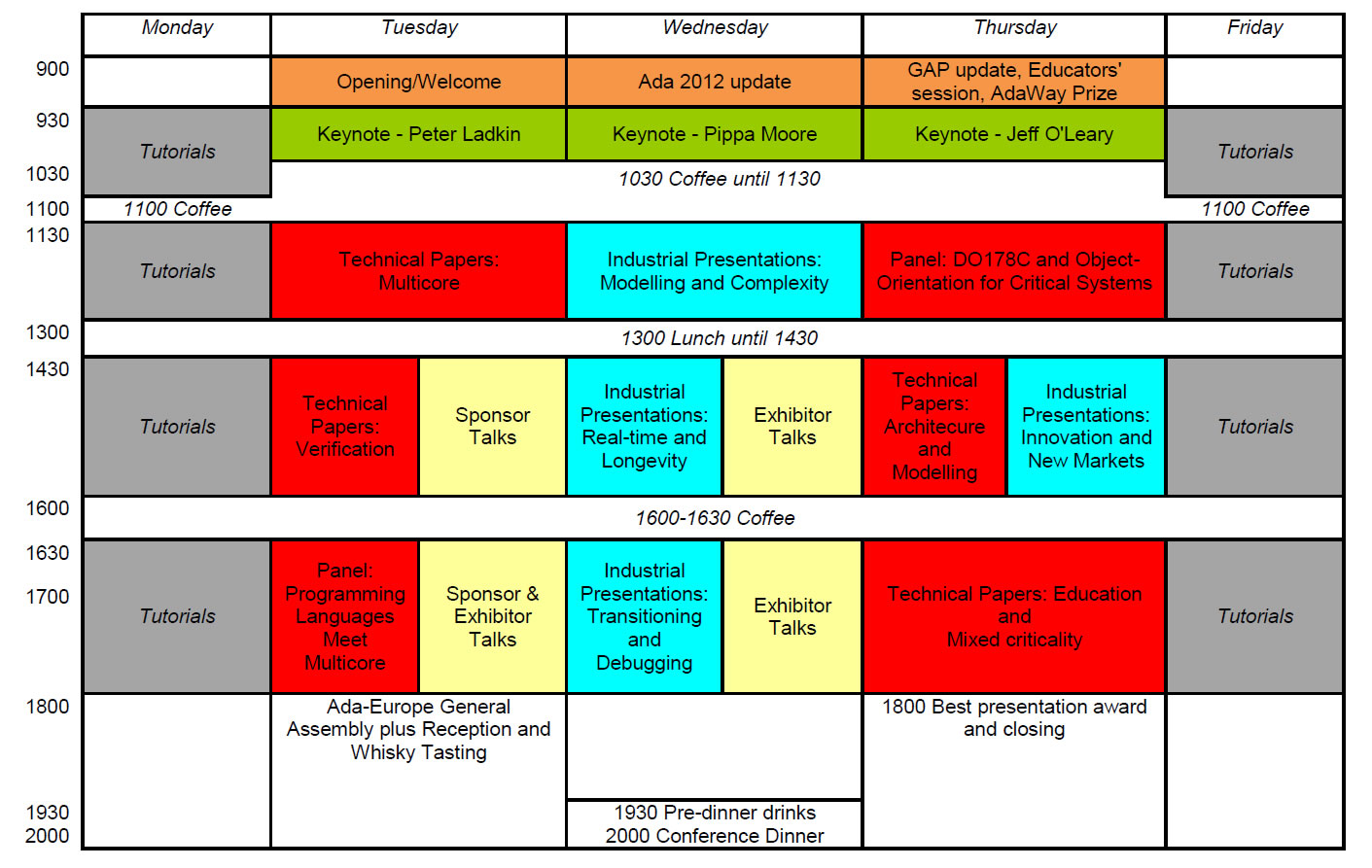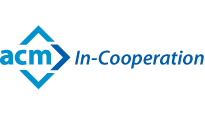Conference Programme
This page provides an overview of the Conference. For full details the provisional programme brochure can be downloaded.
The advance conference programme is available to download here.
Overview of the week

Tutorial Programme
The conference schedule includes two full days of tutorials running as three parallel tracks on Monday and Friday.
The programme this year features six half day tutorials on Monday and three full day tutorials on Friday.
All of the tutorials are delivered by recognized domain experts, addressing a range of individual topics within the general scope of the conference.
Morning tutorials sessions will start at 0930 and end at 1300. Afternoon sessions will start at 1430 and end at 1800. Coffee breaks will be from 1100 to 1130 and 1600 to 1630.
Half Day Tutorials - Monday 20th June
| Number | Session |
Speaker & Title |
|---|---|---|
| T1 | Morning |
S. Tucker Taft
Experimenting with ParaSail
- Parallel Specification and Implementation Language |
| T2 | Morning |
Jean-Pierre Rosen Designing and Checking Coding Standards for Ada |
| T3 | Morning |
Maciej Sobczak Programming Distributed Systems with YAMI4 |
| T4 | Afternoon |
Ian Broster Why and How to Measure Non-functional Properties On-target |
| T5 | Afternoon |
Pat Rogers
Hard Real-Time and Embedded Systems Programming with Ada |
| T6 | Afternoon |
Jean-Pierre Rosen
Use of Object-Oriented Technologies
in High-Reliability Systems |
Full Day Tutorials - Friday 24th June
| Number | Session |
Speaker & Title |
|---|---|---|
| T7 | Full Day |
Michael G. Harbour MAST: Predicting Response Times in Event-Driven Real-Time Systems |
| T8 | Full Day |
Roderick Chapman
SPARK: The Libre Language and Toolset for High-Assurance Software |
| T9 | Full Day |
Thomas Quinot Distributed Programming Techniques in Ada |
Industrial Presentations
The conference schedule includes three sessions of tutorials running as parallel tracks on Wednesday and Thursday.
Wednesday 22nd June
Modelling and Complexity - 1130 to 1300
Sam Moody |
Executable UML Models for High Integrity Development |
|---|---|
Jean-Charles Dalbin |
Software/Automatic Code Generation and Tool Qualification Expert |
Frank Dordowsky |
Implementing a Software Product Line for a Complex Avionics System in Ada83 |
Real-time and Longevity - 1430 to 1600
James Moore |
Finding and Fixing Vulnerabilities in Programming Languages |
|---|---|
Josef Cvirik |
Real-Time Management and Production Systems for Manufacturing and Energy Facilities |
Frederic Pinot |
Ada experience: ANSALDO Railways 'Available Safety Computer' CSD |
Transitioning and Debugging - 1630 to 1800
Wiljan Derks |
Debugging Mechatronic Applications written in Ada |
|---|---|
Alex Deas |
The transition from MISRC C to SPARK Ada in Active Life Support |
Dewi Daniels |
An Overview of DO-178C |
Thursday 23rd June
Innovation and New Markets - 1430 to 1600
Phil Thornley |
The Implementation of High Integrity Dad Structures |
|---|---|
Andrew Coombes |
Building Software Tools in Ada: the Rapita Experience |
Jacob Sparre |
"Crimeville" - using Ada inside an On-line Multi-user Game |
Panel Sessions
Tuesday 1630 to 1800 - Programming Languages Meet Multicore
Moderator: Erhard Plödereder (University of Stuttgart)
Panellists: Alan Burns (University of York), Tucker Taft (Sofcheck, Inc), Kevin Hammond (University of St Andrews)
The advent of multicore is shaking the very foundations of programming languages for concurrency, resource sharing, synchronisation, etc. The panel will discuss topics that need to be addressed by language designers as they strive to support the move towards multicore applications and much higher degrees of concurrency in the execution of programmes.
Thursday 1130 to 1300 - DO178C and Object-Orientation for Critical Systems
Moderator: Ibrahim Habli (University of York)
Panellists: Cyrille Comar (AdaCore), Jean-Pierre Rosen (Adalog), Dewi Daniels (Verocel), Trevor Jennings (Altran Praxis)
The high-integrity systems industry faces the challenge of reaping the benefit of object-orientation in their rigid and demanding development process. Domain experts will debate pros and cons, risks and opportunities, and ways to introduce elements of object-orientation into safety-critical system development.


